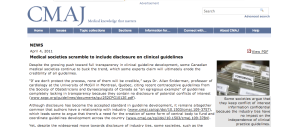April 26, 2011
By Kate Johnson
The Society of Obstetricians and Gynaecologists of Canada (SOGC) has a chance to redeem itself and make good on its controversial new contraceptive guidelines.
As I wrote in my last post, the guidelines are tainted with undisclosed conflicts of interest, calling their recommendations into question.
Now, two new studies in the British Medical Journal have made the guidelines redundant – presenting the SOGC with a rare opportunity to correct its mistakes (BMJ 2011;340:d2151 and BMJ 2011;340:d2139).Read More »
